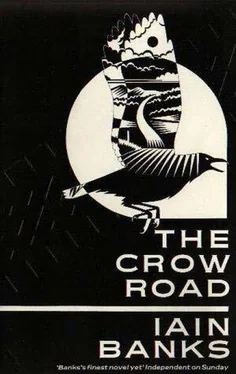Iain Banks - The Crow Road
Здесь есть возможность читать онлайн «Iain Banks - The Crow Road» весь текст электронной книги совершенно бесплатно (целиком полную версию без сокращений). В некоторых случаях можно слушать аудио, скачать через торрент в формате fb2 и присутствует краткое содержание. Год выпуска: 1992, Жанр: Современная проза, на английском языке. Описание произведения, (предисловие) а так же отзывы посетителей доступны на портале библиотеки ЛибКат.
- Название:The Crow Road
- Автор:
- Жанр:
- Год:1992
- ISBN:нет данных
- Рейтинг книги:5 / 5. Голосов: 1
-
Избранное:Добавить в избранное
- Отзывы:
-
Ваша оценка:
- 100
- 1
- 2
- 3
- 4
- 5
The Crow Road: краткое содержание, описание и аннотация
Предлагаем к чтению аннотацию, описание, краткое содержание или предисловие (зависит от того, что написал сам автор книги «The Crow Road»). Если вы не нашли необходимую информацию о книге — напишите в комментариях, мы постараемся отыскать её.
The Crow Road — читать онлайн бесплатно полную книгу (весь текст) целиком
Ниже представлен текст книги, разбитый по страницам. Система сохранения места последней прочитанной страницы, позволяет с удобством читать онлайн бесплатно книгу «The Crow Road», без необходимости каждый раз заново искать на чём Вы остановились. Поставьте закладку, и сможете в любой момент перейти на страницу, на которой закончили чтение.
Интервал:
Закладка:
Fiona kept her face away from him, looking out into the night, watching the vertical bright line of light the car threw onto the serried mass of dark conifers. Even there she could not escape him; she could see his distorted image in the slanted glass of the car's windows, dim in the background, still lit by his instruments.
She wondered how she could ever have thought that she loved him, and why she had stayed with him for so long after she'd realised that if she ever had, she did not love him now.
Of course she could say it was for the children, as people always did… It was true, up to a point. How terrible it was to have those easy phrases, trotted out so often in the course of gossip, or heart-to-hearts, or in magazine articles, or even court cases, become so real.
It was never the sort of thing you thought about when you were young, when you were — or thought you were — in love, and all the future shone with promise.
Problems belonged to other people. You might imagine supporting them, talking with them when they needed to talk, trying to help, but you didn't imagine that you would be the one desperate to talk (or the one too embarrassed to talk, too ashamed or too proud to talk); you didn't imagine you would be the one who needed help, not even when you told friends that of course there might be problems, or agreed with your beloved that you would always talk about things…
Staying together for the children.
And for the adults, she thought. For the sake of appearances. God, she had thought she was above that sort of thing, once. She had been bright and free and determined and she had decided she was going to make her own way in the world, just as well as any of her brothers might. She'd been a sort of feminist before it became fashionable; never had much time for all that sisterly stuff, but she was positive she was as good as any man and she'd prove it… And marrying Ferg had seemed like an extra boost to her life-plan. London had been exciting, but she had not shone out there, she felt, the way she had here. She had never felt any affection for the place and had made no friends there she would miss; and anyway, she would find fields to conquer up here, coming home triumphant to wed the lord of the manor.
But it had not been as she had imagined. She had expected to be the centre of things in Gallanach, but the McHoans as a family had so many other things happening to them; she had felt peripheral. The Urvills" own history, too, made her feel like something unimportant on the family tree, for all that Fergus talked of responsibility and duty and one's debt to the next generation.
She was a leaf, expendable. A twig — maybe — at best.
Somehow all her dreams had disappeared. It seemed to her now that all she had ever had had been the dream of having dreams; the goal of having goals one day, once she had made up her mind what it was she wanted.
But that had never happened. First Fergus, then the twins, then her own small part in the society of the town and the people there, and in the wider, still circumferential concerns of this wee country's middle-to-ruling classes, and in the more dissipated commonwealth of mildly powerful people who were their peers beyond that — in England, on the continent, from the States and elsewhere — took up her time, sapped her will and replaced her own concerns with theirs.
So now, she thought, I am married to a man whose touch disgusts me, and who anyway does not seem to want to touch me. She looked at Fergus's dim reflection, distorted in the glass, then tried to re-focus on her own image. Can he find me as repellent as I find him? I can't look that bad, can I? A few grey hairs, but you don't notice them; still a size twelve, and I've looked after myself. I look good in this, your standard little black number, and I still get into a tight pair of jeans… What's wrong with me? What did I do? Why does he have to spend half his time with that drunken, brassy bitch?
God, the best time I've had in the past five years was one night with Lachy Watt, angry at Ferg, and more surprised than anything else. The way he just took my hair in one hand, while we were standing looking up at that God-awful window in the great hall, and turned my head to him, and pulled me close; tongue down my throat before I knew what was happening, and there was something adolescent and desperate beneath all that working-class directness, but Jesus, I felt wanted…
She shook her head. That was best left out of it. Once was once; dismissible. Ever again would set a pattern. Lachy had been back one time afterwards that she knew of, a year later, and he had called, but she'd told him she wouldn't be able to see him, and put the phone down on him. No, that didn't matter.
She looked at the reflection of Fergus again, as he pulled the wheel; the car tunnelled into the forest, the wall of trees on either side a blur, their greenness more remembered than seen.
I could leave him, she thought. I could always have left him. But mother's too close for comfort; there'd be too many nearby friends, too many chances of bumping into people I'd rather not bump into; too much mitigating against the clean break; new start. God, I'm pathetic, though, that's so petty. Why haven't I the sheer drive to just get up and go, take the twins and emigrate to Oz or Canada? Or live in wild eccentricity in London or Paris?
Or I can stay, as I know I probably will. Muddle through. Look after the twins and try to make sure they negotiate the reefs of puberty and adolescence, set them up to make their way in the world, and do so without becoming just like me…
She looked out, into the grey sweep of road ever rushing towards them. Fergus powered the car down out of the forest, through some more houses and a few lights. The car lurched. Fergus looked over, smiled at her. She didn't know whether to smile back or not, and she wondered what that expression had meant, and what had been going through his head for the last few miles.
The car jiggled on its springs, lurched again and settled. She clutched at her seat, looking forward. The engine roared.
She looked back at Ferg, saw tears in his eyes. "Ferg?" she said.
The car skidded a little, came straight; she glanced forward at the road, saw the corner and the trees. She clutched at the dashboard with both hands. "Ferg!" she screamed. "Look —!"
CHAPTER 13
I was eleven when Aunt Fiona died; I remember feeling both peeved and cheated that I was thought too young to go to the funeral. It would have been my chance to show how mature I had become, and anyway from what I'd seen on television and films, funerals looked like rather dramatic and romantic events; people dressed in black and looked sombre. They had thin, tight lips, and they sometimes wept, and there was a lot of grim clutching of other people's shoulders, and low mutterings about how so-and-so had been a good person, and that sort of thing. But under it all was the simple, joyous fact: they were dead and you weren't yet!
I hadn't got to see Aunt Fiona being buried, but I did see Uncle Fergus in hospital. I was in, too, getting my appendix out, and I went along from my ward to his room just to say how sorry I was. He had a broken arm, some cracked ribs, and his whole face was bruised; kids with face-paints couldn't have matched all those colours. I'd never seen anything like it.
There wasn't much to say; I can't remember what I did say. He kept talking about not being able to remember anything after passing Lochgair, no matter how hard he tried. He couldn't understand why she hadn't been wearing her seatbelt. He'd thought she had been, but they said she hadn't. She hadn't. He started to cry.
I sat on the giant, corroded lump of concrete and steel, legs crossed, arms folded, watching the waves break on the sands below and listening to the strange, whooping, hooting sounds and hollow clanging noises produced by the fluted pipes and iron doors embedded in the fractionally tilted concrete mass.
Читать дальшеИнтервал:
Закладка:
Похожие книги на «The Crow Road»
Представляем Вашему вниманию похожие книги на «The Crow Road» списком для выбора. Мы отобрали схожую по названию и смыслу литературу в надежде предоставить читателям больше вариантов отыскать новые, интересные, ещё непрочитанные произведения.
Обсуждение, отзывы о книге «The Crow Road» и просто собственные мнения читателей. Оставьте ваши комментарии, напишите, что Вы думаете о произведении, его смысле или главных героях. Укажите что конкретно понравилось, а что нет, и почему Вы так считаете.












